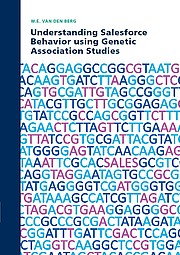Understanding Salesforce Behavior using Genetic Association Studies Defended on Friday, 16 May 2014
Using genetic association studies, this thesis aims to investigate the drivers of successful customer-salesperson interactions in a context where knowledge development has become crucial to the value creation process. Central to this thesis is the developing role of the contemporary sales professional. Coming from transaction-based selling and passing through an era of consultative selling sales strategies, we observe an emerging role for sales professionals as knowledge brokers. Indeed, sales professionals are crucial in linking different parties both within and outside their firm, creating a flow of knowledge between different members of the network. In line with this, salespeople should be able to shift their strategies from a short-term focus on the (immediate) sale, to a more long-term and customer centered approach aimed on opportunity identification.
he results presented in this thesis suggest that some sales professionals have an innate tendency to make an active effort to spot novel opportunities to help solve customers’ needs. To build long-term, valuable relationships with their customers, they will be most effective if they take a self-reliant and curious approach.
Keywords
Sales performance, Salespeople, Salesforce, DNA, Genetics, Neuroscience, Customer orientation, knowledge brokering, dopamine, nature vs. nurture.











